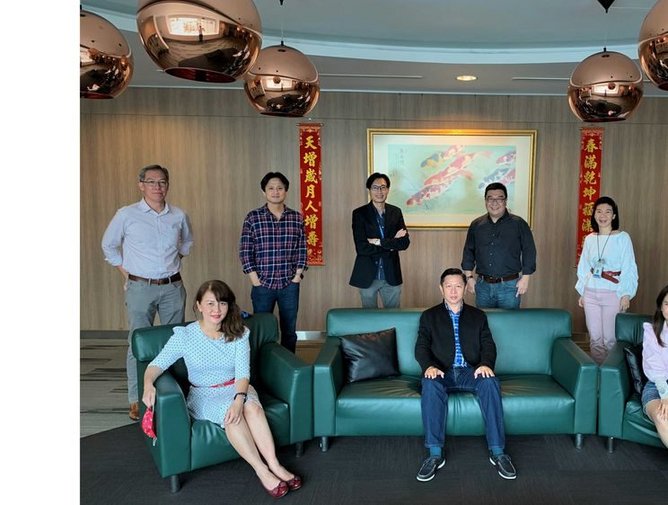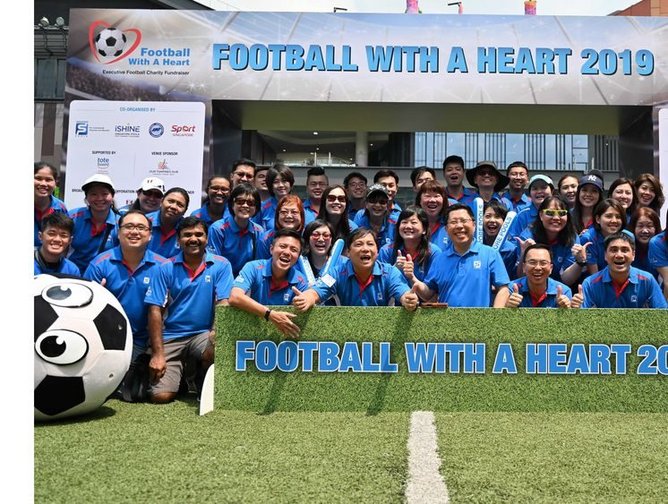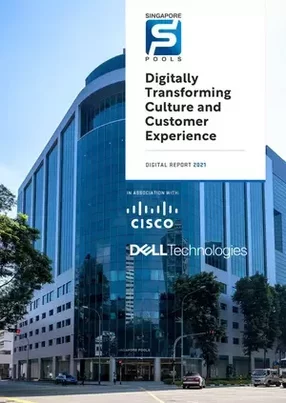Singapore Pools: socially responsible gambling powered by technology
Yeo Teck Guan is a man on a mission. Since joining Singapore Pools - Singapore’s state-owned gambling non-profit - in 2012, Yeo has worked tirelessly to enact a complete digital overview of the organisation’s capabilities and strategy. “Digital transformation is key. So it has been important to figure out how Singapore Pools, as a very traditional company with a long history, could leverage technology,” he explains. “Along the way we've learned a lot about how best to shape the customer experience and better support our customers.”
This month, we sat down with Yeo to discuss the ongoing digital transformation strategy he is spearheading, shifting Singapore Pools from a legacy organisation to an agile, digitally empowered business.
A Safer Bet
When Singapore gained its independence in 1965, the new government found itself faced with a number of challenges, one of which being illegal gambling. However, the new government was aware that a blanket ban - like Prohibition in the United States - would simply drive those activities underground, putting more money in the pockets of triads and illegal bookkeepers, creating an unsafe experience for Singaporeans looking to bet.
“During that time there were a lot of illegal activities, including gambling, that were causing problems for the country,” explains Yeo. “So, the Singapore Government decided to form an entity to look into solving the issues around illegal gambling.”
The result was Singapore Pools. Established three years later in 1968, the organisation is a wholly owned subsidiary of the Singapore Tote Board, which reports to the Singapore Government’s Ministry of Finance. Over the past 50 years, Singapore Pools has played a leading role in combating the country’s illegal gambling scene.
“Our mission was to provide those people who bet with a safe and trusted environment in which to do it, and ensure that the surplus revenue from gambling in Singapore could be channelled back into supporting the community through charities, rather than lining the pockets of illegal syndicates,” Yeo explains, adding that, in the decades since its inception, Singapore Pools has earned the trust of the country’s citizens.
First and foremost, Singapore Pools does not tax player winnings. “Unlike in a lot of other countries, if you win a million dollars, you get to keep a million dollars,” says Yeo. And all the surplus revenue is channelled back to the government where it's used to build national stadiums and so forth.”
Place your Bets…
Singapore Pools’ roster of products has grown over the years, offering Singaporeans even more ways to bet safely and responsibly, offering an alternative to illegal gambling avenues.
Toto is a 6-out-of-49 state lottery game. First played in 1968, Toto is Singapore Pools’ oldest, and one of its most popular products.
The Singapore Sweep was introduced in 1969, and involves a seven-digit sweepstake drawn once a month.
4D is Singapore Pools’ third lottery. The four-digit game hit the market in May of 1986 and holds prize draws every Wednesday, Saturday and Sunday.
Lastly, in 1999, Singapore Pools added sports betting to its portfolio, initially covering football, but adding motorsport in 2008 and horse racing in 2019.
In the 2019/2020 financial year, Singapore Pools collected close to S$9bn. Of that total, S$6.3bn - 70% of the total - was returned to the winners, 22% was collected by the government as tax revenue, and 5% was channelled to the Tote Board to be redirected to charities and grants that support the arts, community development, charity, education, health and sports sectors, with the remaining 3% representing the organisation’s operating costs.
Digitally Transforming the Customer Experience
The first step Yeo and his team took was transforming the Singapore Pools’ customer touchpoints, which were very traditional counter-service based and in-person when he arrived. He quickly launched digital channels and a mobile platform for Singapore Pools customers to onboard, manage their accounts and bet online. The platform is also supporting Singapore Pools’ efforts to work with the authorities on combating illegal gambling activity.
Next, Yeo and his team rolled out new, digital branches. “Traditionally, customers come into our physical locations, speak to someone at a counter to place their bets, pay their money and so forth,” Yeo explains. “The digital branches will be fully automated; you step under a light which enables you to make a mobile payment, and then you just walk out. It's made it very seamless for customers to enter our locations, place a bet and be on their way without having to wait in line.”
Socially Responsible Gambling
Both the Singapore Pools app and digital branches are leveraging facial recognition in their onboarding process, not only to make the customer experience more frictionless and improve security, but also to help further the organisation’s mission to promote socially responsible gambling. “Facial recognition helps ensure our customers bet more responsibly. Traditionally, if a customer was turned away from a physical counter because they had reached their daily limit, they could just go to another location and keep gambling there,” says Yeo. “Through our mobile app, customers can set themselves a daily limit. The facial recognition then means you can't just go to another counter somewhere else and keep betting over your limit.”
Singapore Pools is a member of the World Lottery Association (WLA), which comprises more than 80 countries and oversees socially responsible gambling practices across the globe. “We have achieved the highest level of certification from the WLA, which we have maintained since 2012,” says Yeo. At the same time, Yeo adds that they partner with the Singapore government and the National Council on Problem Gambling to provide them with insights into problem gambling in Singapore and how best to fight it.
Making the Most of DR OpEx
“Traditionally, any CIO will tell you that you run your digital services on one data centre, and have a second running passively for disaster recovery (DR) backup,” Yeo notes. “Our DR has always been a big operational expense and, with the latest technology available, we're looking at using our DR facility to support the operational capacity of our standard data centre, meaning we have as much as 200% capacity to support customer demand for our digital services.”
Unlocking additional capacity has become even more essential during the COVID-19 crisis, which caused a global spike in data demand which, combined with the Singapore Government’s recent moratorium on new data centre builds, means that getting the most out of available digital infrastructure is a higher priority than ever.
“My team and I are trying to get rid of our DR data centre and pivot towards using it to better support our customers,” says Yeo, adding that Singapore Pools’ strategic partner, Dell EMC, “has been chosen to help us with this because their position in the technology landscape gels nicely with what we’re looking to accomplish.”
In the Wake of COVID-19
The Coronavirus pandemic had a dramatic effect on the operations of enterprises across the world, with some being better prepared to meet its challenges than others. “COVID-19 has created a number of pain points for us, and solving them has required a change mindset,” says Yeo. Singapore went into lockdown for two months during 2020. “We were all working from home. We were lucky that our digital journey was already well underway when the pandemic hit,” Yeo adds. “We had already transitioned to Office 365, which meant we were well positioned to make the jump to working remotely. Singapore Pools' staff basically faced no difficulties during the lockdown.”
However, Yeo notes that the shift to remote work elevated the cyber security risks that Singapore Pools faced. With some older staff working remotely in the cloud for the first time in their careers, Yeo explains that the whole company “needed to be extra vigilant when it came to cyber attacks.” In response, Singapore Pools has been conducting regular anti-phishing campaigns to better train its staff to recognise and report any suspicious activity.
Training has been an essential part of managing cultural change amid a digital transformation and the constraints of COVID-19. “There's been a lot of training and teaching over the past year. During the pandemic we've also held quarterly virtual town halls which we use to keep employees informed, and to educate them about upcoming changes,” Yeo says. “Change mindset needs to be top down and also bottom up. The senior management needs to provide support and leadership on our initiatives and instil confidence in the staff. Bottom up is about understanding whether our staff like and see the value in different tools and initiatives.” Yeo’s team set up forums for Singapore Pools staff to share their opinions, comments and suggestions on new initiatives, which were then incorporated into the company’s ongoing strategy.
Leveraging on IT infrastructure to help charities digitalise
Singapore Pools has always aspired to be a “Company for Good” and is committed to leverage their strengths to achieve this goal. Leveraging their technology capital and IT expertise to benefit the community, Singapore Pools set up iShine Cloud in 2018.
iShine Cloud is a charity that provides other charities with an affordable and integrated suite of charity-specific solutions via a secure cloud-based IT platform. Using Singapore Pools’ IT infrastructure, as well as other resources, iShine Cloud aims to improve the productivity, governance and efficiency of operations of charities, thus enabling them to focus on better serving their beneficiaries.
With iShine Cloud, Singapore Pools is able to help keep charities running amid the COVID-19 crisis. While the rest of Singapore forges ahead with various Smart Nation initiatives, the nonprofit sector has been struggling to pick up the pace. Digitisation is therefore paramount to address these challenges.
iShine Cloud has since onboarded 31 charities with 1,512 users and is looking to expand its solutions and support more charities in the future.
2021 and Beyond
Yeo is always looking for the next project. He admits that, due to the COVID-19 pandemic, a few strategic goals weren’t accomplished in 2020. “Because of COVID-19, things were obviously slower last year; instead of nine or 10 megaprojects, we only did five. Having said that, we still managed to go ahead with some essential projects,” he says. “This year, we will continue on our journey to upgrade and consolidate our major systems, bringing in our global partners to help us move forward and improve.” As for what the future holds, Yeo adds that the achievements in digital transformation thus far would not have been possible without his capable and forward-looking team. “Ultimately, it is with the support of this very team that I am confident that we can continue our transformative success here in Singapore Pools.”




